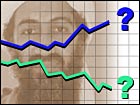|
What's he worth?
|
 |
November 30, 2001: 5:41 p.m. ET
Bush put a $25 million bounty on bin Laden's head. But what would his capture mean to the market.
By Staff Writer Victoria Zunitch
|
NEW YORK (CNN/Money) - It's impossible to quantify what the capture of Osama bin Laden would mean to the families of the thousands of people who died on Sept. 11, or to the nation as a whole. He's Public Enemy No. 1, after all, and the terrorist attacks hit the U.S. where it hurt, wounding its citizens' sense of security in their homeland.
But what would his capture be worth to the stock market?
The stock market was closed for four trading days after the attacks, then reopened on Monday, Sept. 17 with a stunning 684-point drop in the Dow Jones industrial average, the largest one-day point drop in history. Investors continued to struggle with grief and fear throughout the week, and by Friday, Sept. 21, the Dow was down more than 14 percent from its Sept. 10 close.
But stocks have rallied nearly 20 percent in recent weeks, in part because of improving progress in the war in Afghanistan, and perhaps, a growing sense that the U.S. is closer to getting bin Laden.
Nevertheless, don't get too carried away. The capture of bin Laden would likely cause stocks to pop -- maybe 50 to 100 points on the Dow -- but that would be about it. Then investors would quickly get back to worrying about the economy, and all of the other things that could go wrong. "To have any more than that would have to mean that people really thought that the possibility of his capture would really remove (terrorism)," which is unlikely, says Dave Herron, head of listed trading for Charles Schwab.
Larger terrorism and geopolitical problems would soon suck the juice out of any capture rally, says Jack Regan, head of derivative products trading at Josephthal, Lyon & Ross. "Over the (following) weekend when all of the talking heads sit down, that's it." Al Qaeda and the rest of the global terrorist threat, the problem of capturing bin Laden's lieutenants, if still at large, and the parochial problems of Afghanistan and its governance would soon move to the fore.
Dead or alive?
Traders are split over whether bin Laden is worth more to stocks dead than alive. "If you catch him alive, then you have the whole problem of what do you do with him?," says Kevin Gooley, market analyst at Standard & Poor's.
"If we find him dead, I think the Dow goes up 100 points and it's a short-term top. If we catch him alive, the market goes up maybe 50 points and then goes down," says Al Goldman, chief markets strategist for A.G. Edwards. Markets like certainty, and death provides more certainty than the problems confronting the U.S. upon the capture of a living bin Laden.
Regan offers a contrary opinion. "It may be better to capture him alive than dead," Regan says. "You'd have the world to see, 'We caught the bad guy.'"
In the end, the market will get back to trading on fundamentals -- specifically, the economy and corporate earnings. The U.S. Commerce Department said Friday that third-quarter Gross Domestic Product contracted by 1.1 percent, more than the initial 0.4 percent estimate; the National Bureau of Economic Research declared on Monday that a U.S. recession did indeed begin in March of 2001, and corporations put in a rather shoddy third quarter of earnings results.
Bernie Schaeffer, chairman of Schaeffer's Investment Research, thinks the market -- after its recent rally -- is already straining to read all news as positive. "Forget about dead, alive, military tribunal, court trial with jury," says Schaeffer. "My feeling is that the market will want to move higher in the short term and I don't know whether that short-term is a day or a week or an hour," he says. "But I think it's going to be kind of one of these Chinese food kind of deals: a little while later, the market is going to kind of forget it and it's going to be hungry for good news again." 
Click here to send mail to Victoria Zunitch
|
|
|
|
|
|

|

